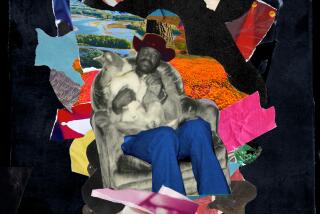JAZZ REVIEW : Rowles May Feel Poorly, but His Sound Is Hale, Hearty
- Share via
HUNTINGTON BEACH — Jimmy Rowles may not feel his best these days, but his piano playing remains, to employ the succinct phrase that Duke Ellington used to describe individual excellence, “beyond category.”
The 74-year-old artist made a rare public appearance Sunday at Maxwell’s, where he worked with his brass-playing daughter, Stacy, bassist Jim De Julio and drummer Harold Mason. And although Rowles brought along an oxygen tank (he suffers from severe emphysema and had to take a few whiffs of the stuff during his first set), it didn’t get in the way of the show. The veteran jazzman was as musical as ever.
The pianist who gained renown in the late ‘40s and ‘50s backing such singers as Billie Holiday and Peggy Lee has a unique and elegant style. It’s built around a soft, soothing touch that gives his instrument’s notes an almost bell-like ring; a superb ear for harmony that results in warm, copacetic accompaniment (it’s no wonder singers adore him); a melodic grace that imbues his improvised lines with bouquets of color and a keen, unwavering sense of time.
Jerome Kern’s 1939 masterpiece “All the Things You Are,” a tune whose complex chord structure and enduring melody has made it a favored jazz vehicle since the ‘40s, opened the performance. Stacy Rowles, reviewed recently at this club, played that melody on fluegelhorn. As she soloed, her father--dressed casually in shades of gray that matched his steel-gray hair, back straight and his left foot tapping--offered chords behind her, creating a carpet of sound on which she strolled.
Jimmy Rowles’ solo began with gently repeated two-note fragments that led to a vaulting chordal leap and a meandering line that sparkled. Then came jaunty chords that recalled Thelonious Monk: a bit of melody that was sweet enough to be called cocktailish and a series of statements that rumbled around like stones in a tin can.
Later, De Julio added one of his flavorful solos. Working with his eyes closed, he picked fluid ideas that included a descending line that brought to mind the David Rose number, “Holiday for Strings,” and another that leaped from his instrument’s lower register to high, thinner notes.
Stacy Rowles sang Ray Noble’s lovely but rarely heard “Do You Know Why the Stars Come Out at Night?” with a sandpaperish yet dulcet voice. In his solo, Jimmy mirrored the melody, offering his own version of the song. His luxurious sound, again coaxed forth with extreme subtlety, made his improvisation sing.
For “June Night,” Stacy performed on the golden trompette, which looks like a miniature valve trombone. When her father soloed, he played staggered tones that sounded like someone walking up a staircase, and a phrase in which adjoining notes were banged simultaneously, as if they were bumping into each other like two drunks weaving along. He also dropped in sudden jumps from low notes to higher ones, and clusters of tones that glowed.
If the set had a low point, it was when Jimmy Rowles gamely tried to sing “My Ideal” in his wondrous scratchy voice. But after a couple of attempts, he aborted his effort, apparently unable to garner enough breath to sing. “I can’t do it,” he said to his daughter, obviously perturbed at his inability to produce something that had long been a part of his artistry.
The set concluded with a brisk look at “There Is No Greater Love.” Here Rowles was brief and to the point, making even the smallest idea ring with musicality.
One can only hope that Rowles’ condition remains stable and that he can appear on a more consistent basis. He’s simply one of the treasures of this country’s jazz scene.
More to Read
The biggest entertainment stories
Get our big stories about Hollywood, film, television, music, arts, culture and more right in your inbox as soon as they publish.
You may occasionally receive promotional content from the Los Angeles Times.










